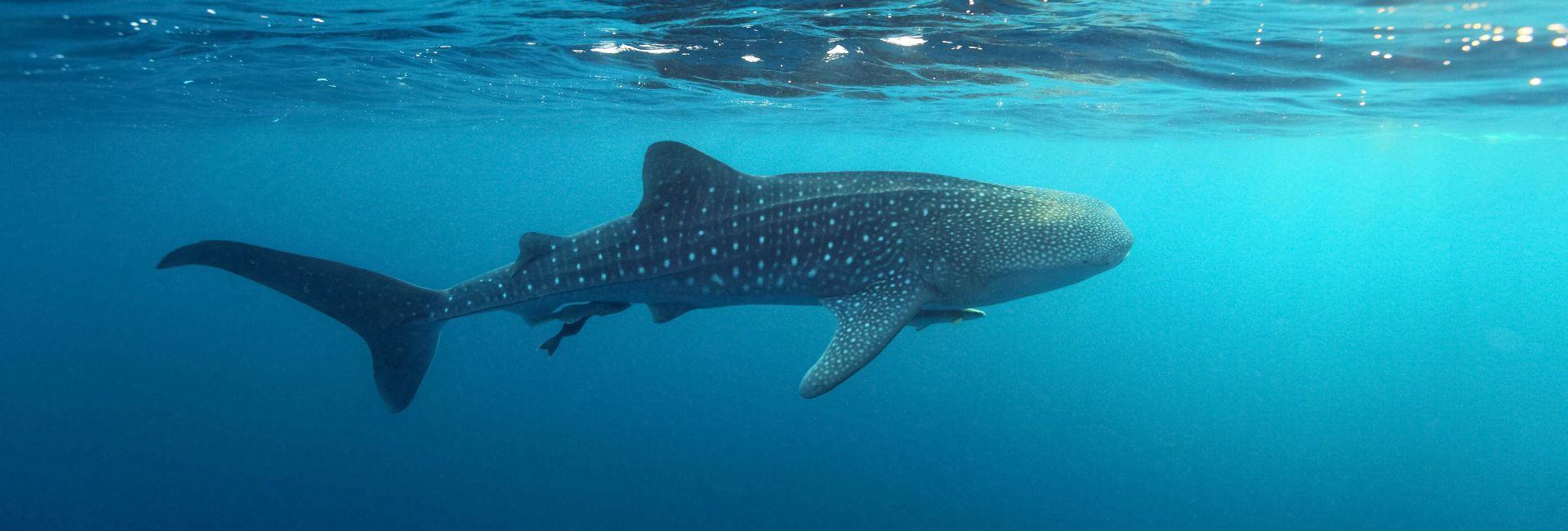August 30th marks the fifth anniversary of World Whale Shark Day and arguably this year, it’s more important than ever. These gentle giants, which weigh on average 18.7 tonnes and can be up to 12 meters long, were declared an endangered species in 2016 due to their declining populations around the globe. So little is known about this elusive species, and that includes exactly how many that remain on earth today, which is why research and conservation efforts are vital for ensuring a future for these amazing animals.

What And How Do Whale Sharks Eat?
‘So are they whales or sharks?’ we hear so many ask… Their confusing name is stemmed from their diet and the way in which they feed; like whales, they are filter feeders, passively filtering everything in their path by jutting out their ginormous jaws! Despite their intimidating name and their classification as a species of shark, they have teeth only 6mm long, feed on plankton and pose no threat to humans. Young whale sharks have even been known to play with divers! It comes as a surprise to many that not all sharks are predatory and there are other species of shark with a similar nature to these spotted fellows; including the basking shark which ironically gets mistaken for its relative, the almighty great white - although their temperaments could not be further apart.
Where Do Whale Sharks Live?
These gentle giants prefer life in warmer waters and populate all tropical seas. As a result, they can be found in countries like Mexico, the Maldives, Tanzania’s Mafia Island and the Philippines just to name a few. Each spring, the whale sharks are known to migrate to the continental shelf of the central west coast of Australia where the Ningaloo Reef provides an abundance of plankton.
What Are Some Characteristics Of Whale Sharks?
- Whale sharks swim at speeds of 5km/h and prefer to roam in shallow seas, which unfortunately has contributed to their decline as their docile nature makes them vulnerable.
- Each whale shark has a unique spot pattern that allows them to be individually identified, which is a great help for conservationists as it helps massively when collecting and collating data about their behaviour and migration patterns.
- A whale shark’s jaws can be up to 5 feet wide!
- A whale shark’s body is black to brown and has white spots among pale vertical and horizontal stripes, along with a white tummy!
- The lifespan of a whale shark is estimated from 70 to 100 years; however, they reach sexual maturity at around 30 years of age.
Picture Credit Goes To Simon Pierce and more of his amazing photos can be found at https://www.simonjpierce.com/.
What’s behind the declining population of whale sharks?
The biggest threat to the whale shark comes from humans. Whale sharks are often hunted for the oil from their livers and their meat, which is commonly eaten in areas across Asia. Whale sharks also suffer from an extremely vicious and upsetting practice called “finning”; involving a human cutting the fin of a live shark, and afterwards, throwing the animal overboard to die.
Additionally, unsustainable fishing practises and habitat destruction provides little and fragmented food supplies for the sharks, and this often results in a vicious cycle of further human-animal conflict in the sharks’ search for food.
Whale sharks tend to swim close to the water surface, and consequently there have been numerous reports of fatal collisions with boats, and combined with irresponsible tourism practises, little hope is left for these beautiful creatures.
As they do not reach sexual maturity until around the age of 30, many whale sharks are killed before they have a chance to reproduce, and even when they do, young whale sharks are prey for many other predators roaming in tropical waters.
Picture Credit Goes To Simon Pierce and more of his amazing photos can be found at https://www.simonjpierce.com/.
Whale Shark Conservation Efforts
Thankfully, the US and EU recently closed loopholes in laws to prevent the shocking practice of finning whale sharks. Recently, there has been an increase in shark sanctuaries. These sanctuaries will help the population to increase in a protected environment and in the long-term will hopefully lead to the amount of whale sharks in the ocean increasing again.
There are many companies that practise responsibly within whale shark tourism, so be sure to look up online about who are certified as an ecotourism organisation before swimming with these gracious giants.
On any of our whale shark focused Great Projects, you will help the project facilitators to collect unparalleled research into this amazing species that will provide an insight into the most appropriate ways to preserve them. You can help to educate locals and tourists on how to discover this species in a harmless way, and even take part in beach clean-ups to prevent ocean pollution. You can get up close and personal with the biggest fish on the planet, identify individual whale sharks and take note on their size, sex and more!
World Whale Shark Day is becoming increasingly popular, and the more people that know about the threats this beloved animal faces, the more likely we can reverse the detrimental impact that humans have had upon them.
How can you help?
There are a variety of things that you can do this World Whale Shark Day. Here are a few ideas:
- Show your support on Social Media; make sure your friends know all about the cause and the dangers that whale sharks face.
- Raise money and donate to a charity protecting whale sharks.
- Why not do something amazing? Become a whale shark volunteer! Here at The Great Projects, there’s a wide variety of whale shark initiatives available in Africa and Asia. Check out what we have to offer on our website.
Whatever you decide, make sure you show your support on August 30th for the whale shark!




















